#roland canterbury
Explore tagged Tumblr posts
Text
Stickmintober 2024: Day 6

Underrated BG Character / Crossover
Roland Canterbury and Royal Guard No.1 (King's Quest) talk captain business!


#- I've been told my favorite characters just tend to be guys with good fashion sense and fancy mustaches#- for some reason#- im slowly figuring out how to make my pieces take less time! ^^ and im less burnt out because of it :D!#thsc#kings quest#digital art#character design#fanart#stickmintober2024#stickmintober#thsc roland canterbury#royal guard no1 kq
39 notes
·
View notes
Text
TVOGXART corporation but its only the doodles (cw. blood and eyes)

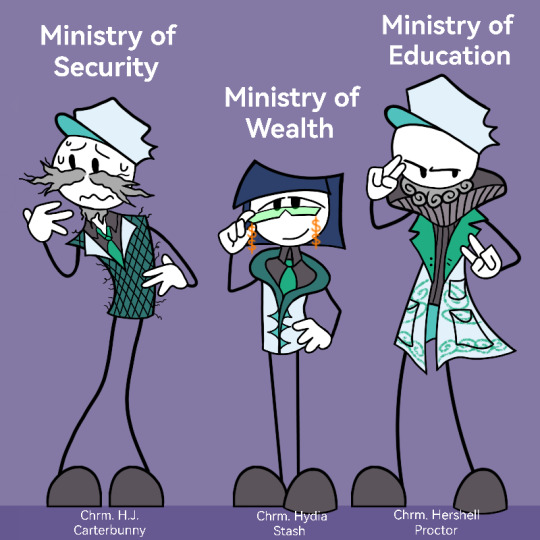

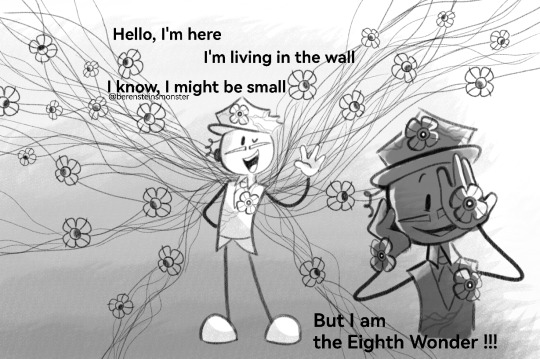
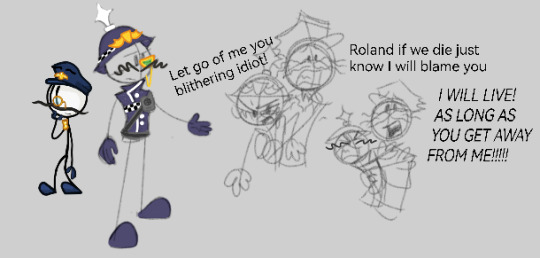



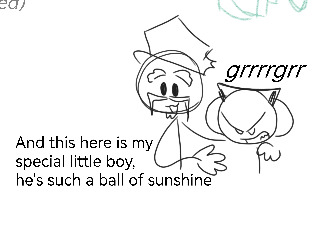







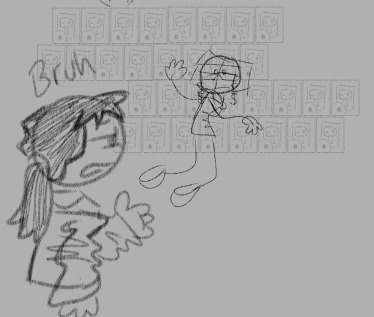
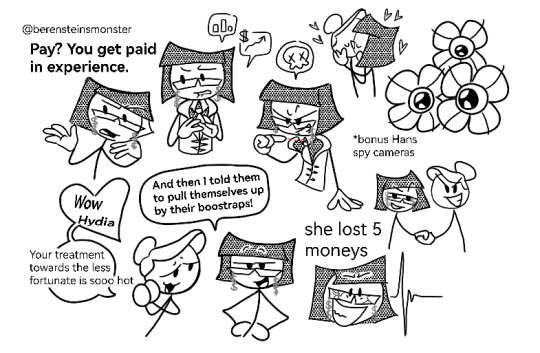


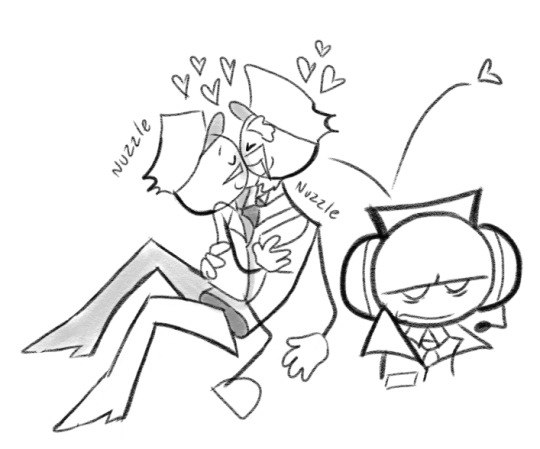
I have a huge ramble about the tvogxart corporation here. check it out ... with character explanations... i love talking about my hv au all day all the time
ty to people and friends who've been supporting my art and au the whole way it means alot :]
#berenmon art#my art#hey guys u know my art that i posted 12 hours ago? here it is again but without the words#henry ventriloquest au#charles rebelivin#hubert bailfalse#hans nonayme#victoria grin#hj carterbunny#hydia stash#hershell proctor#scott mccoolsvile#roland carterbunny#thsc au#the henry stickmin collection au#henry stickmin collection au#henry stickmin au#henry stickmin collection#the henry stickmin collection#charles calvin au#charles calvin#thsc hubert galeforce#hubert galeforce#victoria grit#thsc victoria grit#hj canterbury#hershell panzer#thsc oc#thsc fanart#thsc fandom
34 notes
·
View notes
Text
I know I sound like a broken record, but it really is amazing that The Mabinogi and the poems of Dafydd ap Gwilym aren't in the "medieval" or "classic lit" section of every single bookstore, especially major chains
#went to my local bookstore and i was able to find the taín but not the mabinogi#and ngl of the two of them the Mabinogi is just. Better as a piece of lit#i mean we know why it's because of colonialism#but if either of them had been written in English. They'd have surpassed Beowulf. Or the Canterbury Tales.#which isn't a knock against the other two it's just. God I wish that there wasn't still this cloud of colonialism around what we consider#to be 'medieval literature'#or part of the medieval literary canon#going to start pretending like I don't know what Chaucer and the Chanson de Roland are#'i'm sorry that stuff is just. it's too OBSCURE you know. And I don't really know Middle English either :( It's just too difficult#the spellings are too difficult :( and have you looked at the PRONUNCIATION :(
16 notes
·
View notes
Text
Some readings and resources for further exploration of medieval literature, history, and art
"The Canterbury Tales" by Geoffrey Chaucer
"Beowulf" translated by Seamus Heaney
"The Song of Roland" translated by Dorothy L. Sayers
"The Divine Comedy" by Dante Alighieri
"The Decameron" by Giovanni Boccaccio
"The Book of Margery Kempe" by Margery Kempe
"The Lais of Marie de France" translated by Glyn S. Burgess and Keith Busby
"The History of the Kings of Britain" by Geoffrey of Monmouth
"The Mabinogion" translated by Sioned Davies
"The Romance of Tristan and Iseult" translated by Joseph Bédier
In addition to these literary works, here are some resources for further exploration of medieval history and art:
"A Short History of the Middle Ages" by Barbara H. Rosenwein
"The Civilization of the Middle Ages" by Norman F. Cantor
"The Time Traveler's Guide to Medieval England" by Ian Mortimer
"The Oxford Illustrated History of Medieval Europe" edited by George Holmes
"Medieval Art" by Veronica Sekules
"A Medieval Life : Cecilia Penifader and the world of English peasants before the plague" by Judith Bennett
"The Oxford Handbook of Women and Gender in Medieval Europe" by Judith M. Bennett, Ruth Mazo Karras
The Metropolitan Museum of Art's collection of medieval art and artifacts
The British Library's collection of medieval manuscripts and documents
The Medieval Academy of America's resources and publications on medieval studies
The International Center of Medieval Art's resources and publications on medieval art
These resources should provide a good starting point for further exploration of medieval literature, history, and art.
330 notes
·
View notes
Text
Respectfully, I 110% disagree. These are great shorthand terms for discussing perspective and metatextual analysis of works. I would have loved having them in my pocket back when I was in college.
Then again I feel pretty strongly that the overuse of specialized academic/technical language is just another way we gatekeep information. Using a term like “watsonian” or “retcon” or “lampshade” or even “poor little meow meow” doesn’t make your opinion invalid and has little to no bearing on how educated you actually are. They’re useful terms, they just arose from a different context. Some of those have even been absorbed back into literary criticism because they’re useful.
That said, no one should take themselves too seriously when discussing literary criticism. It’s just blorbos all the way down.
any meta that tries to take itself as Serious Literary Reading that genuinely uses the terms watsonian and doylist. i cannot take seriously. you look like a fool
#you can be passionate about a subject without taking it too seriously#literature is goofy ass shit and always has been#i mean the canterbury tales has a dude farting on a guy's face#tale of a thousand nights has a story about a guy obsessed with his penis size#chanson de roland has the main character blow a horn so hard *his head explodes*
2 notes
·
View notes
Note
what kind of books do you like reading?
My favorite era is 19th century Russian literature. Some of my favorites from there are Dead Souls by Gogol, Fathers and Sons by Ivan Turgenev, Eugene Onegin by Alexander Pushkin, and Oblomov by Ivan Goncharov (I was utterly baffled as to why everyone was talking about Ivan Goncharov when I came back to Tumblr!). I loved a lot of early 20th century American literature, in particular F. Scott Fitzgerald, who was an early hero, and I also read a lot of Joseph Heller and Vladimir Nabokov (Russian/American). I've read everything by Franz Kafka—even the bizarre stuff, like Amerika—and loved it all. My favorite writer of all time is Virginia Woolf, and I love reading writers who experiment with style (Lewis Carroll, of all people, has a nice early example of stream of consciousness with Sylvie and Bruno). I think the best piece of writing I've ever seen from America is Invisible Man by Ralph Ellison.
I've also read and enjoyed some stuff from the 16th-18th centuries (in particular, Ludovico Ariosto's Orlando Furioso, Edmund Spencer's The Faerie Queene, and John Milton's Paradise Lost), but a lot more that's a lot older. Giovanni Boccaccio's The Decameron is a great collection of tales like The Canterbury Tales, but better (note: I haven't yet read 1,001 Nights. Thomas Malory's Le Morte d'Arthur was a lot of fun. I slowed down a lot about eight years ago). I even love the fake ones that are tales within tales like Jan Potocki's The Manuscript Found at Saragossa. But I love chasing down and reading older works, like sagas and epics. Some of my favorites are The Nibelungenlied, The Kalevala, Njal's Saga, and The Epic of Sundiata. Gilgamesh is absolutely incredible. I've read some clunkers, though, like The Song of Roland, which I found dry, dull, and short.
As my reading slowed, I liked to read books aimed at young readers. Growing up, I loved the Oz books, which I find to be an utterly fascinating example of uniquely American (and non-European) fantasy. We have that and Little Nemo, but most other fantasy you get (outside of modern times) is distinctly European, and owes more to Lord Dunsany and Tolkien than anyone else. I loved The 13 1/2 Lives of Captain Bluebear, which I just finished ready to my daughter (Walter Moers). Michael Ende's The Neverending Story is probably the best book for young readers I've read. And then there's the Moomin books by Tove Jansson... What a find those were! Written for kids, but so unbelievably melancholic and subtle! Every page is packed with so much loneliness and longing! I couldn't even believe what I'd read after reading Tales from Moomin Valley. "The Fillyjonk who Believed in Disasters" is something I think every adult should read. It reminds me a bit of The Magic Mountain (see below) in how subtly it captures a character or series of character traits that are quite natural and recognizable, but so hard to pin down! Tove Jansson was brilliant.
For utter, nonsensical, bizarre, indulgent, and absurd escapism, I read E. T. A. Hoffmann. It's hard to even describe how ridiculous his stuff is. Like...you read this stuff, and are saying, "You can't DO that! You'd be laughed off AO3 for that!" And yet he does. And he doesn't care. He had an audience of one, and that was himself. I have no idea how his works are even remembered. Utterly bizarre.
That captures a lot of it. Here are some that don't fit elsewhere:
The Buru Quartet by Pramoedya Ananta Toer (masterful)
Death of a Salesman by Arthur Miller (wrecked me)
Moby Dick by Herman Melville (tore through it!)
Don Quixote by Miguel de Cervantes Saavedra (this one, too! Thick book, but such a quick and joyful read—and written with such exquisite detail!)
Frankenstein by Mary Shelley (one of the best of the 19th century)
The Magic Mountain by Thomas Mann (so subtle... Let me tell you, this is a long book, and like, it's 90% over, and suddenly this new character is introduced, and it's like, "What even is this…?", and yet, somehow, he takes like 50 pages, and you suddenly care about this guy... Astonishing)
The House of Mirth by Edith Wharton (tour de force; her best, in my opinion)
Cat's Cradle by Kurt Vonnegut (his best that I've read, and the one I'd recommend to everyone)
Forest of a Thousand Daemons by D. O. Fagunwa (terrible translation, but so wonderfully inventive!)
Black Elk Speaks (I want to mention this, because I really loved it, but it has a problematic history, so fyi)
True Grit by Charles Portis (one of the most beautiful short novels I've ever read; the Cohen Bros. adaptation is actually very, very close to it)
The Awakening by Kate Chopin (what a smack in the face that one is!)
The Tempest by Shakespeare (my favorite of his)
The Narrative of the Life of Frederick Douglass (best written work from America in the 19th century)
The Autobiography of Benjamin Franklin (by contrast, one of the most ridiculous things I've ever read in my life; HILARIOUS)
Journey to the West by Wu Cheng'en (read the whole thing, and...wow. lol So much repetition with humor throughout capped off by brilliance)
The Bostonians by Henry James (the best demonstration of exactly what he aimed to do: produce an ending that has two equally plausible and utterly opposite interpretations that can both be supported textually)
Nohow On by Samuel Beckett (the culmination of his work, and a worthy one)
Three Tales by Gustave Flaubert (I bawled—loudly—after reading "A Simple Heart"; I couldn't help it)
Thanks for asking this! It's been so long since I've really read... It's nice to remember. I wanted to read the Studs Lonigan trilogy for ages now... Oh, and I went through a Gabriel García Márquez phase! And Tom Robbins! And, of course, I've read all the wonderful comic novels by my friend Nina Post, whose wit astounds me.
Okay, now I'm just not getting to sleep. But this is some of what I've read that I've loved. Also, for certain things, I've read a lot (like 19th century Russian literature and Samuel Beckett), so I can tell you what not to read. For example, A Hero of Our Time by Lermontov? Pass. Same with The Golovlovs by Saltykov-Shchedrin. You can probably pass on War and Peace, as well, due to its girth, but you're going to miss some good stuff (amidst a lot of dry stuff).
Okay, hitting the button now! I'm done.
(Oh, but if you were assigned Their Eyes Were Watching God and kind of passed on it because it was a "school book", that was a mistake!!!)
(Oh, Cane by Jean Toomer!)
(Oh, and if you want a short one that has a "wah-wah!" ending, check out As I Lay Dying by Faulkner! lol That rascal...)
(OH! And the "school book" thing? Hard ditto on Of Mice and Men. Holy shit, that book... Wow.)
(OMG BABBIT!!!!! I loved it!!! Pass on Main Street, though.)
(Oh, and John Updike can miss me with his Rabbit stuff... YIKES!)
(Oh, and if you like Woody Allen's style but not Woody Allen, try Portnoy's Complaint.)
(Last one: Jasmine by my short fiction professor Bharati Mukherjee, who sadly passed away far too soon. On the last day of class, she'd forgotten she was going to have us read Notes from Underground by Fyodor Dostoevsky. As we were walking out the door, she made us promise to read it. I never saw her again, but I did, Ms. Mukherjee, and it was tremendous. Thank you so much for what you gave me. I had so much trouble showing my work to other people before that class. You helped me so much, and I wish I could've told you. You may think those who have influenced you will be around forever for you to thank one day, but they're not. Today's the day. Tell them what they meant to you. You'll regret it if you don't.)
#books#reading#literature#too many to tag#but I'm tagging Virginia Woolf#she's amazing#if I could recommend one for Tumblr#Orlando#you won't regret it#oh and Emily Dickinson#OH THE BOSTONIANS BY HENRY JAMES#adding it now
63 notes
·
View notes
Text
MORTIMER ADLER’S READING LIST (PART 1)
Reading list from “How To Read a Book” by Mortimer Adler (1972 edition).
Homer: Iliad, Odyssey
The Old Testament
Aeschylus: Tragedies
Sophocles: Tragedies
Herodotus: Histories
Euripides: Tragedies
Thucydides: History of the Peloponnesian War
Hippocrates: Medical Writings
Aristophanes: Comedies
Plato: Dialogues
Aristotle: Works
Epicurus: Letter to Herodotus; Letter to Menoecus
Euclid: Elements
Archimedes: Works
Apollonius of Perga: Conic Sections
Cicero: Works
Lucretius: On the Nature of Things
Virgil: Works
Horace: Works
Livy: History of Rome
Ovid: Works
Plutarch: Parallel Lives; Moralia
Tacitus: Histories; Annals; Agricola Germania
Nicomachus of Gerasa: Introduction to Arithmetic
Epictetus: Discourses; Encheiridion
Ptolemy: Almagest
Lucian: Works
Marcus Aurelius: Meditations
Galen: On the Natural Faculties
The New Testament
Plotinus: The Enneads
St. Augustine: On the Teacher; Confessions; City of God; On Christian Doctrine
The Song of Roland
The Nibelungenlied
The Saga of Burnt Njál
St. Thomas Aquinas: Summa Theologica
Dante Alighieri: The Divine Comedy;The New Life; On Monarchy
Geoffrey Chaucer: Troilus and Criseyde; The Canterbury Tales
Leonardo da Vinci: Notebooks
Niccolò Machiavelli: The Prince; Discourses on the First Ten Books of Livy
Desiderius Erasmus: The Praise of Folly
Nicolaus Copernicus: On the Revolutions of the Heavenly Spheres
Thomas More: Utopia
Martin Luther: Table Talk; Three Treatises
Francois Rabelais: Gargantua and Pantagruel
John Calvin: Institutes of the Christian Religion
Michel de Montaigne: Essays
William Gilbert: On the Loadstone and Magnetic Bodies
Miguel de Cervantes: Don Quixote
Edmund Spenser: Prothalamion; The Faerie Queene
Francis Bacon: Essays; Advancement of Learning; Novum Organum, The New Atlantis
William Shakespeare: Poetry and Plays
Galileo Galilei: Starry Messenger; Dialogues Concerning Two New Sciences
Johannes Kepler: Epitome of Copernican Astronomy; Concerning the Harmonies of the World
William Harvey: On the Motion of the Heart and Blood in Animals; On the Circulation of the Blood; On the Generation of Animals
Thomas Hobbes: Leviathan
René Descartes: Rules for the Direction of the Mind; Discourse on the Method; Geometry; Meditations on First Philosophy
John Milton: Works
Molière: Comedies
Blaise Pascal: The Provincial Letters; Pensees; Scientific Treatises
Christiaan Huygens: Treatise on Light
Benedict de Spinoza: Ethics
John Locke: Letter Concerning Toleration; Of Civil Government; Essay Concerning Human Understanding; Thoughts Concerning Education
Jean Baptiste Racine: Tragedies
Isaac Newton: Mathematical Principles of Natural Philosophy; Optics
Gottfried Wilhelm von Leibniz: Discourse on Metaphysics; New Essays Concerning Human Understanding; Monadology
Daniel Defoe: Robinson Crusoe
Jonathan Swift: A Tale of a Tub; Journal to Stella; Gulliver’s Travels; A Modest Proposal
William Congreve: The Way of the World
George Berkeley: Principles of Human Knowledge
Source: mortimer-adlers-reading-list
#reading list#long post#mortimer adler#text#saved posts#works#books#so much to read#philosophy#literature#dark academia#light academia
4 notes
·
View notes
Text
Epic Fantasy through the Ages
A Chronology of Story
This is a work in progress, but here is my list as of 6 July 2023. Please feel free to send me additions or corrections. I have focused on epic (works that are long and took a long time to create) and fantasy (works that include an element of magic, the supernatural, or superpowers). Some of the list could be categorized as myth, some as Literature™️, some as science fiction, but beyond these categories are the two main criteria of epic and fantasy. I also don't fully know what all of the ancient to modern works encompass, but that's the fun of read and find out. I probably have added some things that don't properly meet my criteria, and that's fine with me. 🌺
Works by Mesopotamian Bards (3100 BC - 539 BC)
Enumah Elish (Epic of Creation)
Atrahasis (The Flood)
Epic of Gilgamesh
Descent of Ishtar
Epic of Erra
Etana
Adapa
Anzu
Nergel and Ereshkigal
Avesta by Zoroastrian Bards (1500 BC)
Ramayana by Valmiki (750+ BC)
Mahabharata by Vayasa (750+ BC)
The Illiad and the Odyssey by Homer (650+ BC)
Thoegeny; Works and Days by Hesiod (650+ BC)
Popol Vuh (4th century BC)
The Torah and other Jewish stories (4th century BC)
Argonautica by Apollonius of Rhodes (270 BC)
Bellum Punicam by Gnaeus Naevius (200 BC)
Annales by Ennius (170 BC)
De Rerum Natura by Lucretius (50 BC)
Poem 64 by Catullus (50 BC)
The Aenid by Virgil (19 BC)
Metamorphoses by Ovid (2 AD)
Punica by Silius Italicus (50 AD)
Satyrica by Petronius (60 AD)
Pharsalia or Bellum Civile by Lucan (62 AD)
Argonautica by Valerius Flaccus (70 AD)
Thebaid by Statius (90 AD)
The Irish Myth Cycles: Mythological, Ulster, Fenian, and Kings (3rd Century AD)
The Bible and other Christian stories (5th century AD)
Dionysiaca by Nonnus of Panopolis (500 AD)
The Quran and other Muslim stories (7th century AD)
Arabian Nights (7th century AD)
Hildebrandslied and other German heroic lays by Bards (830 AD)
Shahnameh by Ferdowsi (977 or 1010 AD)
Chanson de Roland (1125 AD)
Cantar de Mio Sid (1200 AD)
The Dietrich Cycle (1230 AD)
Poetic Edda and Prose Edda by Snorri Sturluson and others (1270 AD)
Beowulf by Old English Bards (11th century AD)
Nibelungenlied by Middle High German Bards (1200)
Amadís de Gaula (13th century AD)
The Divine Comedy by Dante Alghieri (1308)
Teseida by Bocaccio (1340 AD)
Sir Gawain and the Green Knight by Middle English Bards (14th century)
The Canterbury Tales by Geoffrey Chaucer (1392)
Morgante by Luigi Pulci (1483)
Le morte d'Arthur by Thomas Mallory (1485)
Orlando Innamorato by Boiardo (1495)
Orlando Furioso by Ariosto (1516)
Os Lusiadas by Camoes (1572)
Gerusalemme Liberata by Tasso (1581)
Plays and Poems by William Shakespeare (1589)
The Faerie Queen by Edmund Spencer (1590)
Discourses on the Heroic Poem by Tasso (1594)
Don Quixote by Miguel de Cervantes (1614)
L'Adone by Marino (1623)
Paradise Lost; Paradise Regained by Milton (1667)
Le Lutrin by Boileau (1674)
Order and Disorder by Lucy Hutchinson (1679)
Mac Flecknoe; Aenid English translation by Dryden (1682)
The Dispensary bu Samuel Garth (1699)
The Battle of the Books; A Tale of a Tub by Swift (1704)
The Rape of the Lock; Illiad and Odyssey English translations; Dunciad by Pope (1714)
The Vanity of Human Wishes by Samuel Johnson (1749)
Scribleriad by Richard Owen Cambridge (1751)
Faust by Goethe (1772)
The Triumphs of Temper; Essay on Epic Poetry by William Hayley (1782)
The Task by William Cowper (1785)
Joan of Arc; Thalaba the Destroyer; Madoc; The Curse of Kehama by Southey (1796)
The Prelude; The Execution by Wordsworth (1799)
Jerusalem by Blake (1804)
The Rime of the Ancient Mariner by Coleridge (1817)
Laon and Cythna; Peter Bell the Third; Prometheus Unbound by Shelley (1817)
Hyperion: A Fragment; The Fall of Hyperion by Keats (1818)
Don Juan by Byron (1819)
The Kalevala by Elias Lonnrot (1835)
Sohrah and Rustum by Matthew Arnold (1853)
Hiawatha by Longfellow (1855)
Leaves of Grass by Walt Whitman (1855)
Idylls of the King by Lord Alfred Tennyson (1859)
Cantos by Ezra Pound (1917)
The Wasteland by T.S. Eliot (1922)
Ulysses by James Joyce (1922)
The Hobbit/The Lord of the Rings/The Silmarillion etc. by J.R.R. Tolkien (1937)
Gormenghast by Mervyn Peake (1946)
The White Goddess by Robert Graves (1948)
Hero with a Thousand Faces by Joseph Campbell (1949)
The Chronicles of Narnia by C.S. Lewis (1950)
Anathemata by David Jones (1952)
Dune by Frank Herbert (1965)
The Dark Is Rising Sequence by Susan Cooper (1965)
Briggflatts by Basil Bunting (1965)
Earthsea by Ursula K. LeGuin (1968)
Dragonriders of Pern by Anne McCaffrey (1968)
The Chronicles of Amber by Roger Zelazny (1970)
The Vampire Chronicles by Anne Rice (1976)
The Chronicles of Thomas Covenant by Stephen Donaldson (1977)
The Magic of Xanth by Piers Anthony (1977)
Book of the New Sun by Gene Wolf (1980)
The Dark Tower by Stephen King (1982)
Belgariad and Mellorean by David Eddings (1982)
The Mists of Avalon by Marion Zimmer Bradley (1982)
Shannara by Terry Brooks (1982)
The Riftwar Cycle by Raymond E. Feist (1982)
Discworld by Terry Pratchett (1983)
Mythago Wood by Robert Holdstock (1984)
Neuromancer by William Gibson (1984)
The Black Company (1984)
Redwall by Brian Jaques (1986)
Valdemar by Mercedes Lackey (1987)
Memory, Sorrow, Thorn by Tad Williams (1988)
Sandman by Neil Gaimon (1989)
The Wheel of Time by Robert Jordan (1990)
Queen of Angels by Greg Bear (1990)
Newford by Charles de Lint (1990)
Omeros by Derek Walcott (1990)
The Saga of Recluse by L.E. Modesitt, Jr. (1991)
The Witcher by Andrzej Sapkowski (1993)
Sword of Truth by Terry Goodkind (1994)
Realm of the Elderlings by Robin Hobb (1995)
His Dark Materials by Philip Pullman (1995)
Old Kingdom by Garth Nix (1995)
A Song of Ice and Fire/Game of Thrones by George R.R. Martin (1996)
Animorphs by H.A. Applegate (1996)
Crown of Stars by Kate Elliott (1997)
Harry Potter by J.K. Rowling (1997)
The Malazan Book of the Fallen by Steve Erickson (1999)
The Dresden Files by Jim Butcher (2000)
The Inheritance Cycle by Christopher Paolini (2002)
Prince of Nothing by R. Scott Bakker (2003)
Bartimaeus by Jonathan Stroud (2003)
The Gentlemen Bastard Sequence by Scott Lynch (2004)
Twilight by Stephanie Meyer (2005)
Percy Jackson and the Olympians by Rick Riordan (2005)
Temeraire by Naomi Novik (2006)
The First Law by Joe Abercrombie (2006)
Mistborn by Brandon Sanderson (2006)
The Kingkiller Chronicle by Patrick Rothfuss (2007)
Shadows of the Apt by Adrian Tchaikovsky (2008)
The Hunger Games by Suzanne Collins (2008)
Graceling by Kristin Cashore (2008)
Riyria Revelations by Michael J. Sullivan (2008)
Night Angel by Brent Weeks (2008)
The Demon Cycle by Peter V. Brett (2008)
Inheritance by N.K. Jemisin (2010)
The Lightbringer by Brent Weeks (2010)
The Stormlight Archive by Brandon Sanderson (2010)
The Expanse by James S.A. Corey (2011)
The Broken Empire by Mark Lawrence (2011)
The Lunar Chronicles by Marissa Meyer (2012)
Throne of Glass by Sarah J. Maas (2012)
Grishaverse by Leigh Bardugo (2012)
The Traitor Son Cycle by Miles Cameron (2012)
Worm by Wildbow (2013)
The Powder Mage by Brian McClellan (2013)
The Broken Earth by N.K. Jemisin (2015)
Shards of Heaven by Michael Livingston (2015)
The Green Bone Saga by Fonda Lee (2017)
The Band Series by Nicholas Eames (2017)
Winternight by Katherine Arden (2017)
The Folk of the Air by Holly Black (2018)
The Founders by Robert Jackson Bennett (2018)
The Locked Tomb by Tamsyn Muir (2019)
Grave of Empires by Sam Sykes (2019)
Djeliya by Juni Ba (2021)
9 notes
·
View notes
Text
Thsc Height Hcs
It's another Hc post cause I enjoy making them. So I decided to do a little revamp of old Hcs I had like a year ago with the heights I had for Thsc. Again some may be changed later or be updated with more characters in the future.
Character Height Hcs
Henry Stickmin: 6'0" Ellie Rose: 5'9" Charles Calvin: 5'1" Hershell Panzer: 6'10" Johnny Panzer: 6'6" Quentin Alabaster: 5'7" Hj Canterbury: 5'10" Roland Canterbury: 6'0" Hubert Galeforce: 6'2" Dave Panpa: 5'11" Rupert Price: 5'6" Kurt Dietrich: 5'5" Calvin Bukowski: 5'8" Konrad Bukowski: 5'7" Victoria Grit: 5'3" Reginald Copperbottom: 5'10" Right Hand Man: 5'7" Sven Svenson: 5'6" Burt Curtis: 6'3" Earrings: 5'2" Carol Cross: 5'8" Thomas Chestershire: 6'0" Geoffrey Plumb: 5'4"
Ocs: Bernadette Warner: 5'6" Honey Kinsley: 5'4" Keka Alabaster: 5'5" Joseph Warner: 6'1"
#Ask Away#Thsc Hcs#Henry Stickmin Collection#Thsc Oc#Honey Kinsley#Joseph Warner#Bernadette Warner#Keka Alabaster#Thsc Au#Henry Stickmin Hcs#Thsc Honey Kinsley#Thsc Bernadette Warner#Thsc Joseph Warner#Thsc Keka Alabaster
15 notes
·
View notes
Photo
Its 100x funnier when you consider that The Song of Roland aka one of the oldest surviving French lit tortures has a scene with the main character dying on a hill in a very deliberate manner (i know, spoilers, sorry)
Now the question is: is there a very stubborn dog in Beowulf or, idk The Canterbury Tales who won't unbite sth?

In French we don’t say “I’ll die on this hill” we say “Je n’en démordrai pas” which means “I won’t unbite this” and I think it’s beautiful
11K notes
·
View notes
Note
4A for Roland Canterbury/or H.J. Canterbury for the expressions thingie yipeee -sits politely-

Roland Canterbury + Sleepy = work's been busy !
AC Expression Meme
#- did i go a little overboard lol#- maybe#- but im getting more practice animating so its a win for me xP#thsc#thsc roland canterbury#digital art#animation#character design#fanart
39 notes
·
View notes
Note
Meanwhile the officers were at a Graveyard, looking for Johnny, but Captain Roland Canterbury finds another Page
Roland: “I found another one!”
YAY
1 note
·
View note
Text
Il grande attore britannico - morto a Londra lo scorso 30 dicembre 2023 -, interprete di film quali Nel nome del padre di Jim Sheridan, Spiriti nelle tenebre di Stephen Hopkins, Full Monty di Peter Cattaneo, Il senso di Smilla per la neve di Billie August, Wilde di Brian Gilbert, Shakespeare in Love di John Madden, In the Bedroom di Todd Field, L’importanza di chiamarsi Ernest di Oliver Parker, La ragazza con l’orecchino di perla di Peter Webber, BatmanBegins di Christopher Nolan, Un giorno per sbaglio di Julian Fellowes, Michael Clayton di Tony Gilroy, Sogni e delitti di Woody Allen, Operazione Valchiria di Brian Singer, L’uomo nell’ombra di Roman Polanski, The Conspirator di Robert Redford, Marigold Hotel di John Madden, La verità negata di Mick Jackson, Snowden di Oliver Stone e molti altri, compirebbe settantasei anni. Nato a Wharfadale - in Gran Bretagna - nel 1948, Thomas Jeffrey Wilkinson trascorre gli anni giovanili in Canada con la sua famiglia; torna in Inghilterra, dove si laurea in Letteratura inglese e americana presso l’Università del Kent di Canterbury ed entra poi nella Royal Academy of Dramatic Art di Londra. Negli anni Settanta e Ottanta, dopo numerose interpretazioni teatrali, è molto attivo in televisione, interprete di film, serie e miniserie; esordisce al cinema diretto da Andrzej Wajda in La linea d’ombra (1976), ma inizia ad interpretare ruoli di secondo piano - Nel nome del padre (1993) di Jim Sheridan, con Daniel Day-Lewis e Emma Thompson, Il prete (1994) di Antonia Bird, Ragione e sentimento (1995) di Ang Lee, con E. Thompson, Hugh Grant, Kate Winslet e Alan Rickman, Il senso di Smilla per la neve (1997) di Stephen Hopkins, con Julia Ormond, Gabriel Byrne, Richard Harris e Robert Loggia. Il successo arriva con Full Monty - Squattrinati organizzati (1997) di Peter Cattaneo, cui seguiranno ottimi ruoli in film di successo come Shakespeare in Love (1998) di John Madden, con Judy Dench, Gwyneth Paltrow (Oscar come Miglior Attrice Protagonista), Colin Firth, Geoffrey Rush, Il patriota (2000) di Roland Emmerich, con Mel Gibson, In the Bedroom (2001) di Todd Field, con Sissy Spacek, per cui ottiene una nomination all’Oscar come Miglior Attore Protagonista, L’importanza di chiamarsi Ernest (2002) di Oliver Parker, con Colin Firth, Rupert Everett e Judy Dench, La ragazza con l’orecchino di perla(2003) di Peter Webber, con Scarlett Johansson e Colin Firth, Batman Begins(2005) di Christopher Nolan, con Michael Caine, Liam Neeson e Morgan Freeman. Ottima la sua performance - che gli vale la nomination all’Oscar come miglior Attore non Protagonista - in Michael Clayton (2007) di Tony Gilroy, con George Clooney, Tilda Swinton (Oscar come Miglior Attrice non Protagonista) e Sydney Pollack al suo penultimo film, Sogni e delitti (2007) di Woody Allen, con Colin Farrell e Ewan McGregor, Operazione Walkiria (2008) di Bryan Singer, con Tom Cruise e Kenneth Branagh, Il debito (2010) e Marigold Hotel(2012) di John Madden. Negli anni successivi ricordiamo il drammatico La verità negata (2016) di Mick Jackson, con Rachel Weisz - tratto dal libro di Deborah Lipstadt La verità negata. La mia battaglia in tribunale contro chi ha negato l’Olocausto -, Snowden (2016) di Oliver Stone, The Happy Prince - L’ultimo ritratto di Oscar Wilde di Rupert Everett, con R. Everett, Colin Firth e Emma Watson, The Titan(2018) di Lennart Ruff, SAS - L’ascesa del cigno (2021) di Magnus Martens. Attivo anche in televisione, interpreta serie e miniserie - un episodio di Miss Marple (1985), e, negli anni Duemila, il film tv Recount (2008), incentrato sui momenti cruciali delle elezioni presidenziali del 2000, delle serie John Adams (2008), The Kennedys (2011), Belgravia (2020) e Full Monty - La serie (2023) - sequel del già citato film del ’97 -, uscita poco prima della sua improvvisa scomparsa.
0 notes
Photo

The Hubert Galeforce Collection!!! Feat. A LOT of lads! seperate versions below!


#the hubert galeforce collection#thgc#thsc#the henry stickmin collection#hubert galeforce#Dmitri Petrov#gadget gabe#michael galeforce#billy bullet#hershell panzer#hj canterbury#roland canterbury#grigori olyat#trnk#jaques kensington#billy g#reynaldo the brute#sir wilford iv#randy radman#terrence suave#reginald copperbottom
286 notes
·
View notes
Text
Headcanon - Mr. Villain, Captain H.J. Canterbury and Captain Roland Canterbury are all brothers.
#brothers of having mustaches that look villainous but only one actually is#Mr. Villain#Captain H.J. Canterbury#Captain Roland Canterbury#HSC#HSC Headcanon#Henry Stickmin#Henry Stickmin Collection
5 notes
·
View notes
Note
For Roland Canterbury: What’s your relationship with your brother like?

I'd say our relationship is pretty stable.
#Captain Roland Canterbury#Slide 16#henry stickmim collection#henry stickmin#ask govt sticks#ask the govt sticks#asks#anon#post
16 notes
·
View notes